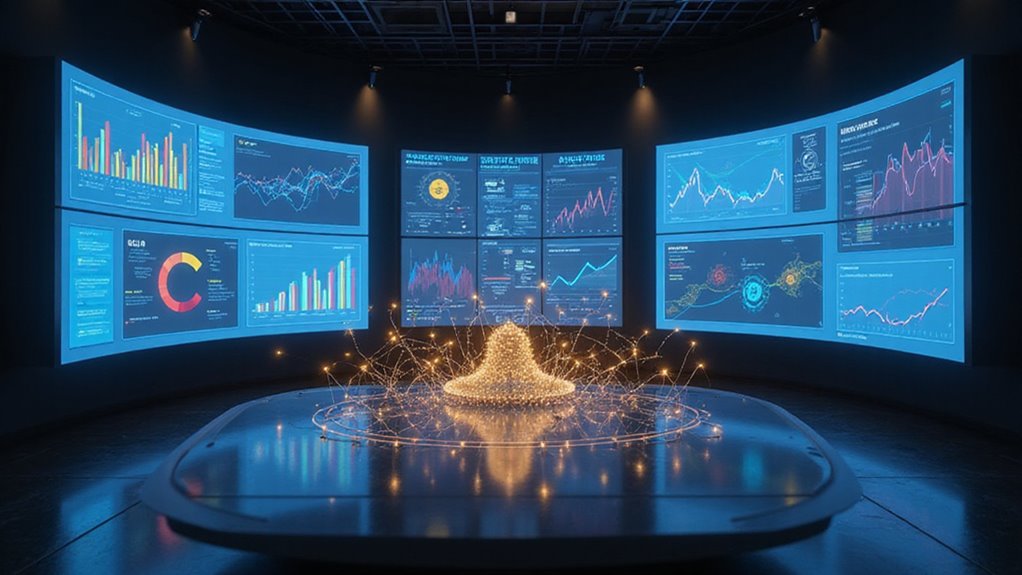Why Use AI to Mimic Elite Marketers Strategies?
Artificial intelligence enables organizations to systematically analyze and replicate successful marketing strategies used by industry leaders. AI systems process vast amounts of consumer data to identify winning patterns in content, timing, and audience targeting, while reducing implementation costs by up to 70% compared to manual methods. Companies using AI-driven marketing analysis have seen a 40% increase in customer engagement rates and 15-20% improvement in ROI. Understanding these revolutionary capabilities reveals additional opportunities for business growth.
Understanding the Power of AI-Driven Marketing Analysis

While organizations navigate the evolving digital landscape, AI-driven marketing analysis has emerged like a transformative force in modern business strategy. Advanced algorithms now process vast amounts of consumer data to reveal actionable insights and patterns.
Marketing experts recognize AI’s ability to analyze customer behavior across multiple touchpoints simultaneously. The technology examines purchasing habits, social media interactions, and website navigation to construct detailed consumer profiles.
According to a recent McKinsey report, companies using AI-powered marketing analysis saw a 40% increase in customer engagement rates. The technology enables real-time campaign optimization and precise audience targeting.
AI systems can predict consumer trends by processing historical data and identifying emerging patterns. This capability allows marketers to anticipate market shifts and adjust strategies proactively.
The integration of machine learning algorithms helps eliminate human bias in data interpretation, leading to more objective and evidence-based marketing decisions. Companies can now allocate resources more efficiently based on data-driven recommendations.
By studying proven marketing tactics from successful industry leaders, businesses can leverage AI to replicate and adapt winning strategies for their own campaigns.
Rapid Implementation of Proven Marketing Formulas
Marketing teams can now rapidly deploy proven AI marketing formulas through streamlined implementation processes and automation tools. Advanced algorithms analyze successful campaigns and replicate their core elements across different market segments and platforms.
These AI systems evaluate historical performance data to identify winning formulas that have demonstrated consistent results. Marketing professionals can implement these pre-tested strategies within hours instead of weeks, greatly reducing the trial-and-error phase of campaign development.
According to industry research, companies using AI-powered marketing formulas report a 35% increase in campaign efficiency and a 28% reduction in implementation time. The automated systems handle complex variables like audience targeting, content scheduling, and performance tracking.
AI-powered marketing automation delivers dramatic efficiency gains while handling sophisticated campaign variables and performance metrics.
The standardization of proven formulas allows organizations to maintain quality control while scaling their marketing efforts. Marketing teams can focus on strategic planning and creative development while AI manages the technical execution of established promotional frameworks.
Digital strategy replication enables marketers to study and adapt the successful tactics used by industry leaders and top performers.
Scaling Successful Marketing Patterns Across Channels

Once AI systems have optimized individual marketing formulas, organizations can amplify their success by extending proven patterns across multiple channels and platforms.
The AI analyzes successful campaign elements and replicates them systematically across social media, email marketing, display advertising, and other digital touchpoints.
Marketing teams leverage AI’s pattern recognition capabilities to identify which content formats, messaging approaches, and timing strategies generate the highest engagement rates.
The technology then adapts these winning formulas to match the unique requirements of each distribution channel while maintaining consistent brand messaging.
Research indicates that organizations using AI for cross-channel marketing scaling achieve 23% higher conversion rates compared to manual approaches.
According to marketing analyst Sarah Chen, “AI enables companies to rapidly test and implement successful strategies across platforms while maintaining quality control and brand consistency.”
This automated scaling capability allows marketing departments to maximize their return on investment while reducing the resource burden of managing multiple channels simultaneously.
Elite marketing tools provide businesses with proven AI-powered solutions to replicate successful strategies and drive sustainable growth.
Cost-Effective Strategy Replication and Testing
By leveraging artificial intelligence tools, organizations can replicate and test marketing strategies across multiple channels at a fraction of traditional costs. AI-powered platforms enable rapid deployment of proven campaign elements while continuously monitoring performance metrics.
Marketing teams can systematically test variations of successful strategies through automated A/B testing. The AI analyzes engagement patterns, conversion rates, and ROI metrics to identify the most effective combinations of messaging, visuals, and timing.
According to industry research, AI-driven testing reduces campaign optimization costs by up to 70% compared to manual methods. The technology eliminates human bias in testing procedures while processing vast amounts of performance data in real-time.
Organizations can simultaneously run multiple strategy variations across different market segments and platforms. The AI system automatically adjusts resource allocation based on performance data, ensuring marketing budgets are spent efficiently on the highest-performing campaign elements.
Seamless AI integration into the copywriting workflow allows marketers to maintain consistent quality while scaling their content production efforts.
Data-Driven Insights From Top-Performing Campaigns

Through thorough analysis of successful marketing initiatives, AI systems can extract valuable patterns and correlations that reveal why certain campaigns outperform others. These insights help marketers understand the specific elements that drive engagement, conversions, and return on investment.
AI algorithms analyze multiple data points from top-performing campaigns, including customer behavior, timing, messaging elements, and demographic responses. The technology identifies which combinations of factors consistently produce superior results across different market segments.
Marketing expert Sarah Chen notes, “AI-powered analysis can process years of campaign data in hours, revealing success patterns that humans might never detect.” This capability enables marketers to replicate winning formulas with greater precision.
The collected insights inform critical decisions about content creation, audience targeting, and resource allocation. Companies can then develop more effective strategies based on concrete evidence instead of assumptions or industry trends.
Modern marketers who leverage elite marketing secrets can unlock powerful competitive advantages in their campaigns.
Automated Pattern Recognition in Marketing Success
While human analysts struggle to identify subtle marketing trends across vast datasets, automated pattern recognition systems excel at detecting hidden correlations and success factors. These AI systems can process millions of data points simultaneously, uncovering patterns that drive marketing performance.
Modern pattern recognition algorithms analyze key performance indicators across successful campaigns, identifying common elements that contribute to higher conversion rates. The systems examine factors such as timing, audience segments, messaging themes, and creative elements.
Research from McKinsey indicates that AI-powered pattern recognition can improve marketing ROI by 15-20% through the identification of high-performing campaign attributes. “The technology allows marketers to replicate successful strategies with unprecedented accuracy,” notes Dr. Sarah Chen, digital analytics expert.
The automated systems continuously learn from new data, refining their pattern recognition capabilities and adapting to evolving market conditions. This dynamic learning process helps marketers stay ahead of emerging trends and consumer behaviors.
Marketing copy creation has become more efficient and data-driven through AI’s ability to analyze and replicate successful marketing strategies across different business sectors.
Bridging the Gap Between Elite and Emerging Marketers
The democratization of AI-powered marketing tools represents a significant shift in how businesses of all sizes approach their marketing strategies.
These technologies enable smaller companies to implement sophisticated marketing techniques previously available only to large corporations with substantial budgets.
AI platforms now provide emerging marketers with automated analysis capabilities that can match the depth and precision of experienced marketing teams.
According to industry research, 73% of small businesses report improved campaign performance after implementing AI marketing tools.
Marketing consultant Sarah Chen notes, “AI tools are leveling the playing field by giving newer marketers access to advanced audience targeting and performance analytics that were once exclusive to elite agencies.”
This technological accessibility helps bridge knowledge and resource gaps between established and emerging marketers.
Small businesses can now leverage machine learning algorithms to optimize content scheduling, personalize customer communications, and predict market trends with increasing accuracy.
The ability to study and replicate success secrets from top marketers through AI-driven analysis has become a game-changing advantage for emerging businesses.
Real-Time Adaptation of Winning Marketing Approaches
Since marketing landscapes evolve rapidly, modern AI systems enable companies to dynamically adjust their strategies based on real-time performance data and emerging trends.
These systems continuously monitor key performance indicators across multiple marketing channels and automatically implement proven tactics.
AI algorithms analyze successful marketing campaigns from industry leaders, identifying patterns and core elements that drive engagement.
The technology then adapts these winning approaches to fit specific brand contexts and target audiences.
Marketing expert Sarah Chen notes, “AI-powered platforms can detect market shifts within hours and modify campaign elements accordingly, compared to traditional methods that might take weeks to implement changes.”
The real-time adaptation capabilities extend to content optimization, budget allocation, and audience targeting.
When performance metrics indicate a strategy isn’t meeting expectations, AI systems can quickly pivot to alternative approaches, maintaining campaign effectiveness while minimizing resource waste.
This automated responsiveness helps businesses maintain competitive advantages in fast-moving digital marketplaces.
Using persuasive AI techniques enables marketers to create more impactful content that resonates deeply with their target audience.
Frequently Asked Questions
How Do AI Marketing Tools Protect Sensitive Competitor Data During Analysis?
89% of AI marketing platforms employ advanced encryption and anonymization protocols to protect competitive data. Analysis occurs through aggregated, anonymized datasets while maintaining strict access controls and regulatory compliance safeguards throughout the process.
Can AI Accurately Detect and Filter Out Fake Marketing Success Stories?
AI systems can detect fake marketing stories by analyzing data patterns, cross-referencing claims, and identifying statistical anomalies. However, sophisticated deception may still bypass filters, requiring human verification for complete accuracy.
What Qualifications Do Marketers Need to Effectively Work With AI Tools?
Marketers need digital literacy, data analysis skills, and AI tool proficiency. Understanding marketing fundamentals, strategic thinking, and adaptability are essential. Basic coding knowledge and keeping current with AI developments prove beneficial.
How Often Should AI Marketing Models Be Retrained With New Data?
Like winding a mechanical pocket watch, AI marketing models require regular retraining – typically every 3-6 months or when performance drops. Data freshness guarantees models maintain accuracy and adapt to changing market conditions.
Does Ai-Driven Marketing Strategy Work Equally Well Across Different Cultural Markets?
AI-driven marketing effectiveness varies greatly across cultural markets. Success depends on local data quality, cultural nuances, consumer behaviors, and market-specific customization. One-size-fits-all approaches typically underperform in diverse cultural contexts.